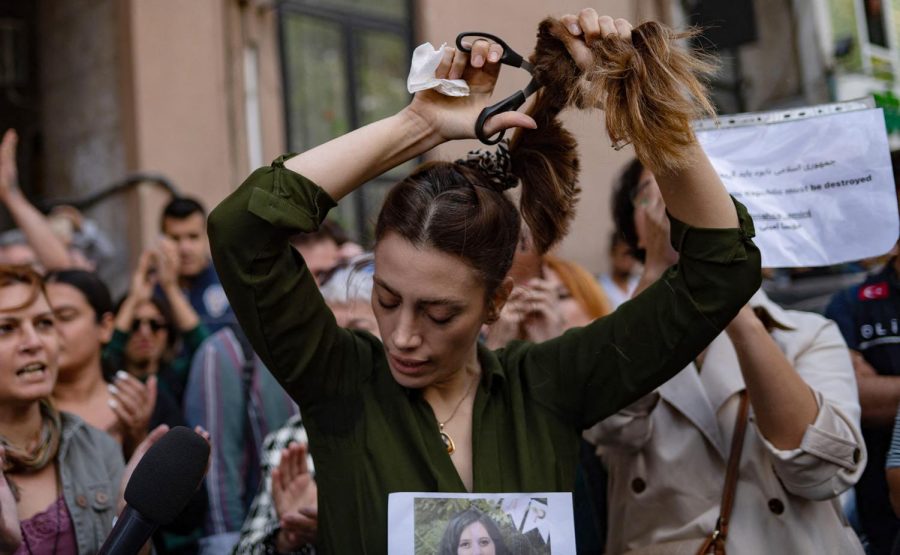Iranian women fight for freedom in protests and demonstrations
Iranian citizens have been protesting demanding an end to women’s oppression by the government. These demonstrations have erupted in response to the death of Mahsa Amini, who was a 22 year old woman who passed away in the custody of Iranian moral police. Amini was arrested for violating the country’s headscarf laws. Many Iranians believe Amini was killed by law enforcement.
Amini’s family and protesters all throughout Iran accuse the Iranian government of covering up her murder, despite the fact that the government says she died of heart disease. The international demonstrations have grown to voice outrage about a variety of topics, including the current regime as well as the limitations women suffer in Iran regarding hijabs and other clothing.
“Death to the oppressor, be it the shah or the supreme leader!” was screamed by Iranians during one demonstration.
Mahsa Amini, 22, was detained by the renowned morality police, who mandate traditional Islamic attire and behavior, on September 13 while visiting Tehran. Regardless of religion or nationality, all women in Iran are required to wear hijabs when out in public. Amini was charged with disobeying the nation’s head-scarf regulations. According to Iran’s security services, Amini was detained at a detention facility where she was trained in hijab protocol after being arrested, and it was there that she suffered a heart attack and passed out. She passed away on September 16 in a hospital in Tehran.
Amini’s family disputes that account claiming that the police beat Amini in their patrol car on the route to the detention facility, according to witnesses, Amini’s father told an Iranian news outlet that he was prohibited from seeing her body in the hospital, but that he was able to catch a glimpse of her bruised foot. Reports indicate that her death was caused by a skull fracture from heavy blows to the head.
The United Nations has called for an independent investigation into Amini’s death after releasing a statement about the rise of the Iranian morality police attacking women over loose hijabs.
Protests began erupting after Amini’s funeral which took place on Sept. 17 in her home region, the Kurdistan province in the country’s northwest. Protests quickly spread across the country reaching as many as 80 cities and even in the capital, Tehran. Iranian women have begun burning hijabs and cutting their hair in public and on social media to show their solidarity with Amini and the cause. Crowds gathered in Tehran’s public squares and shocking videos have gone viral of police assaulting peaceful protestors. Protests have also spread internationally.
The people of Iran have grown tired of living under an authoritarian regime. Citizens of Iran don’t have basic human rights and are forced to comply with laws out of fear. Women in Iran are not only forced to wear the hijab, but also are not allowed to drive, study in various fields, work in certain professions, and more. Women have just recently been allowed to attend sports stadiums to watch men’s sports. A woman’s life in Iran is heavily restricted.
The women of Iran take to the streets in protest, bravely defying Iran’s mandatory hijab laws. They have been fighting for their freedom, basic human rights, equality, and to be given the choice on whether or not they wear the hijab. The youth and women in Iran have formed an alliance using social media as their biggest weapon. Through social media, women have been able to show and talk about the injustices that they experience. This has brought attention to the issue, causing a rise in protests internationally.
Women all over the world and in the United States have been protesting against the Iranian “morality police.” There have been protests in Berlin, Washington, and Los Angeles. The fact that these protests have spread far beyond Iran just goes to show the power which social media and news outlets hold. It also represents the solidarity which women have and the unjust behavior of Iranian police.
“I think what is happening in Iran is horrifying and unacceptable. The “morality police” are forcing women to wear the hijab which directly contradicts their supposed beliefs. Islam condemns religious compulsion and treating women in this way is in no way allowed,” Aisha Ismael senior said.
Iran’s laws against women pushes the stereotype that Islamic women are uneducated and oppressed, when in actuality the Islamic faith honors women and their role in society.
“I support women in making decisions for themselves. Women do not deserve sexual objectification or fetishization. We deserve the bodily autonomy to decide how to dress without facing brutality or death. As a society, I feel we would do well to mind our own business more often,” Ismael said.
Iranian security forces have diffused demonstrations with tear gas and live ammunition. They have killed hundreds of people, mainly young women. The Biden administration says it is looking to impose more sanctions on Iran, they condemn the brutality which women are facing in Iran and are hoping for it to come to an end.
Beyond the injustice which women are facing today, the Iranian people want a change in regime. They find that all their countries’ issues stem back to the government and are protesting and will continue protesting for changes to happen now.

Senior Mariamawit Endalkachew is in her fourth year on the A-blast staff. She is currently pursuing the IB Diploma and is excited for the school year....








